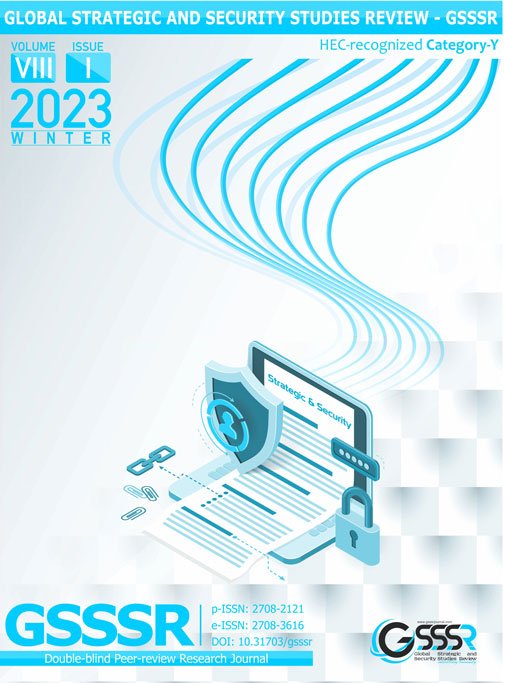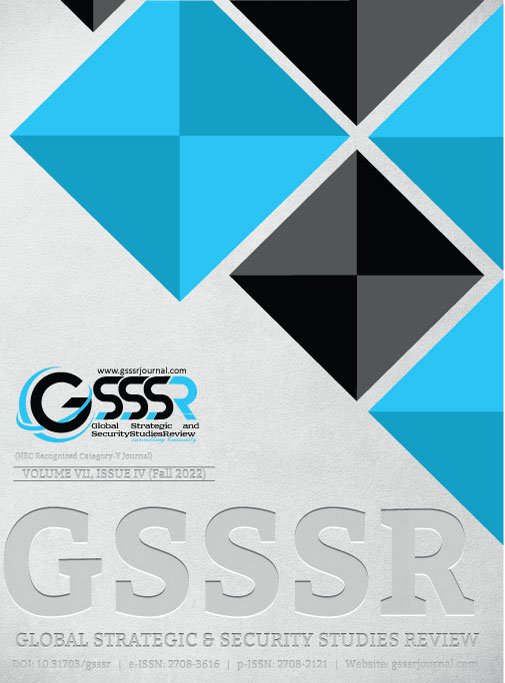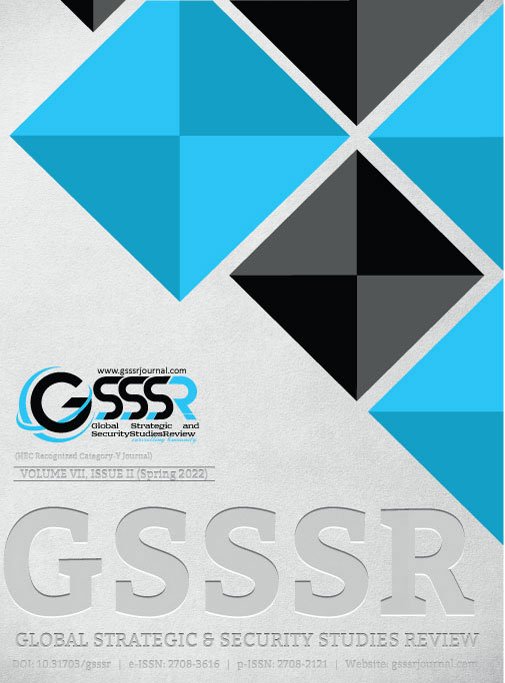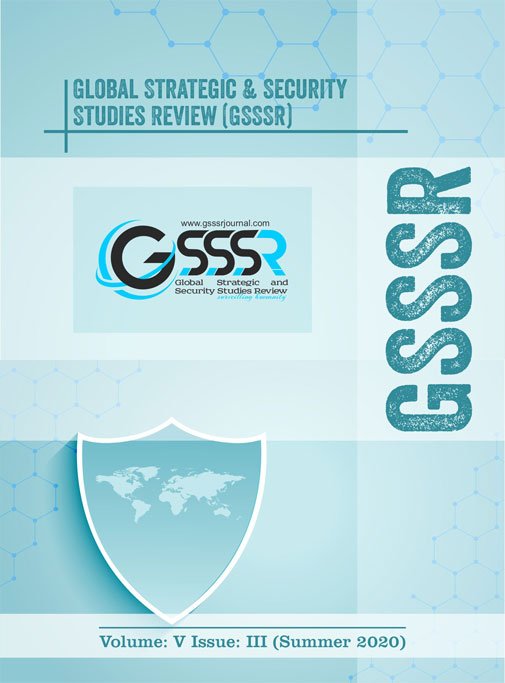01 - US Foreign Policy Towards Pakistan: Editorial Treatment of US & Pakistani Pr
http://dx.doi.org/10.31703/gsssr.2020(V-III).0110.31703/gsssr.2020(V-III).01 Published : Sep 2020
-
This research has been designed to investigate US foreign policy towards Pakistan.It has been summarized while analyzing the US foreign policy towards Pakistan vis-a-vis US-Pak relations before and after Trump being elected as President, the US' shift in policy towards Pakistan might not be as drastic for the Pakistani as public statements of the Trump administration propose, because the prospect ... Details
-
Foreign Policy, Pak-US Relationship, Trump Administration, Policymakers, Military Assistance, Frenemy
-
(1) Ahmed Zuhair Khan
Lecturer, Department of Mass Communication, GC University Faisalabad, Punjab, Pakistan.
(2) Tanveer Hussain
Assistant Professor, School of Media and Communication Studies, University of Management and Technology, Lahore, Punjab, Pakistan.
(3) Ashraf Iqbal
In charge / Assistant Professor, Department of Mass Communication, GC University Faisalabad, Punjab, Pakistan.
02 - Non-Military Confidence Building Measures and their Failure in Indo-Pak History
http://dx.doi.org/10.31703/gsssr.2020(V-III).0210.31703/gsssr.2020(V-III).02 Published : Sep 2020
-
In international relations, an act of demonstrating cooperation and goodwill with an adversary is known as the Confidence-Building measure. The motive behind these measures is to alleviate misapprehension, tension, fear, and angst between two or multiple parties by emphasizing trust and restricting acceleration in a conflict. India and Pakistan share a prolonged history of mistrust and animosity. ... Details
-
CBMs, Aman ki Asha, Agra Summit, Composite Dialogue, Societal CBMs, Negative Peace
-
(1) Areeja Syed
MS, Department of International Relations, COMSATS University Islamabad, Pakistan.
03 - Economic Relations between Pakistan and India: Impressions from the Past and Pr
http://dx.doi.org/10.31703/gsssr.2020(V-III).0310.31703/gsssr.2020(V-III).03 Published : Sep 2020
-
Pakistan and India have failed to establish substantial and sustained economic relations between them. Despite being neighbours, they couldn't enjoy a good volume of bilateral trade in multiple sectors. This study traces the history of bilateral trade between Pakistan and India. While identifying patterns of trade between them, the study attempts to identify barriers in bilateral trade between the... Details
-
Bilateral Trade, Pakistan-India Relations, SAARC, Regionalism, Gravity-Model.
-
(1)
(3) Tahir Ashraf
Assistant Professor, Department of International Relations, Bahauddin Zakariya University Multan, Punjab, Pakistan.
04 - Piracy and Maritime Terrorism; Serious Perils to Sea Security
http://dx.doi.org/10.31703/gsssr.2020(V-III).0410.31703/gsssr.2020(V-III).04 Published : Sep 2020
-
In today's global environment, security concerns are posturing grave and animated challenges towards domestic as well as global stability. Two particular issues, piracy and maritime terrorism, are one of the modern challenges having worldwide bearing on maritime trade and security. The huge and mostly uncontrolled maritime zone permits pirates and terrorists to achieve their ulterior motives. To d... Details
-
Legal Framework, Maritime Security, Maritime Terrorism, Nexus, Piracy, Regional & International Cooperation, Threats
-
(1) Khalil Ur Rahman Khan
Phd Scholar, Department of Law, University of Karachi, Karachi, Sindh, Pakistan.
05 - The Mughal Administration of Justice: An Appraisal
http://dx.doi.org/10.31703/gsssr.2020(V-III).0510.31703/gsssr.2020(V-III).05 Published : Sep 2020
-
In the history of the Indian subcontinent, the claims that the science of administration of justice reached its apex during the period of the Great Mughals are critically investigated in this paper. Though the Mughals initiatives were oriented to public and social welfare, their absolute authority over the state cast shadows on the system they introduced, one of which was administration of justice... Details
-
Mughals, Administration, Subcontinent, Justice, India, Pakistan
-
(1) Bakht Munir
Lecturer, Institute of Languages and Linguistics, New Campus, University of the Punjab, Punjab, Pakistan.
06 - Preparing for the Future War: India and Pakistan's Changing Military Doctrines
http://dx.doi.org/10.31703/gsssr.2020(V-III).0610.31703/gsssr.2020(V-III).06 Published : Sep 2020
-
India and Pakistan have been changing their military doctrines at a faster pace. Indians had been since long focused on the policy of preparing them to fight a full-fledged conventional war against Pakistan. It was the nuclearization of Pakistan that forced them to bring change into Indian military doctrine and focus on a limited war than a full-fledged one. This Indian military tilt pressurized P... Details
-
India, Pakistan, Limited War, Low Yield Nuclear Weapons, Surgical Strikes, Air Strikes
-
(1) Ashfaque Ali Banbhan
Assistant Professor, Institute of Commerce, University of Sindh, Jamshoro, Sindh, Pakistan.
(2) Hussain Abbas
PhD scholar, School of Politics and International Relations, Quaid-i-Azam University, Islamabad, Pakistan.
(3) Farooque Ahmed Leghari
Assistant Professor, Department of International Relations, University of Sindh, Jamshoro, Sindh, Pakistan.
07 - Nuclear efforts of Iran under the shadow of US sanctions
http://dx.doi.org/10.31703/gsssr.2020(V-III).0710.31703/gsssr.2020(V-III).07 Published : Sep 2020
-
Iran has started the Atom program for Peace which has already planned by the US for countries concerned in consuming atomic energy for non-violent devotions. Iran also decided to develop a nuclear program to generate electricity. In 1979 US and the west has temporary banned the project. The United States has applied these sanctions on Iran for various purposes. This includes weakening domestic sup... Details
-
Iran, Nuclear efforts, US Sanctions, isolated, UN Security Council
-
(1) Robina Saeed
Chairperson, School of Mass Communication, Minhaj University, Lahore, Punjab, Pakistan.
(2) Muhammad Munib Khalid
Lecturer, Minhaj University, Lahore, Punjab, Pakistan.
(3) Sajida Begum
Assistant Professor, Minhaj University Lahore, Punjab, Pakistan.
08 - A Decade of Political Unrest: An Analysis of General Zia Era in Pakistan
http://dx.doi.org/10.31703/gsssr.2020(V-III).0810.31703/gsssr.2020(V-III).08 Published : Sep 2020
-
The problem with Pakistan's democracy is not that only political institutions are weak but the interference of non-elected forces has also done havoc with it. Apart from the high handedness of civilian bureaucracy the unswerving military adventurism disrepute the political process of the country. The entry of military into the corridors of powers hit hard the final nail into the coffin of democrat... Details
-
Authoritarianism, Politicians, MRD, Governance and Political Institutions
-
(1) Bakhtiar Khan
Assistant Professor, Department of Political Science, University of Buner, Buner, KP, Pakistan.
(2) Hassan Shah
Lecturer, Department of Political Science, University of Buner, Buner, KP, Pakistan.
(3) Iltaf Khan
PhD Scholar, Pakistan Study Center, University of Peshawar, Peshawar, KP, Pakistan.
09 - The Syrian Peace Process: How Syria Can attain Perpetual Peace?
http://dx.doi.org/10.31703/gsssr.2020(V-III).0910.31703/gsssr.2020(V-III).09 Published : Sep 2020
-
The Civil wars only can end by the total victory of one party against the other or through the table-talks. The progress about the political settlement of the Syrian crisis has stalled, and the Syrian regime did not show preparedness to accompanying its opponents. The regime cannot provoke directly with turkey and United States to asserts its influence in the north and eastern part of Syria. There... Details
-
Syrian Civil War, Peace Talks, Humanitarian Crisis, Refugees, Stability in the Middle East
-
(1) Zab Un Nisa
Assistant Professor, Department of Political Science, Government Graduate College Samanabad, Faisalabad, Punjab, Pakistan.
(2) Gul e Zahra
PhD Scholar, Department of Political Science & International Relations, Government College University, Faisalabad, Punjab, Pakistan.
(3) Syed Waqas Ali Bokhari
M.Phil. Scholar, Department of Political Science & International Relations, Government College University, Faisalabad, Punjab, Pakistan.
10 - An Analysis of Pakistans Role in US Dialogue with Taliban
http://dx.doi.org/10.31703/gsssr.2020(V-III).1010.31703/gsssr.2020(V-III).10 Published : Sep 2020
-
The paper analysis the US talks with the Taliban since they attacked Afghanistan and eliminated Al-Qaeda in October 2001. The piece of study highlights the role-played Islamabad in patching up both Taliban and American for dialogue to come up with a peaceful solution to the US War in Afghanistan. Washington always uses divers' players for holding talks with the Taliban including, Pakistan, Saudi A... Details
-
Talks, USA, Taliban, Pakistan, Strategy, Peace, War, Afghanistan
-
(1) Ijaz Khalid
Demonstrator, Department of Political Science, Abdul Wali Khan University Mardan, KP, Pakistan.
(2) Hina Malik
Demonstrator, Department of Political Science, Abdul Wali Khan University Mardan, KP, Pakistan.
(3) Aneela Akbar
Demonstrator, Department of Political Science, Abdul Wali Khan University Mardan, KP, Pakistan.
11 - China's Courtship with the so Called Rogue States and US Concerns
http://dx.doi.org/10.31703/gsssr.2020(V-III).1110.31703/gsssr.2020(V-III).11 Published : Sep 2020
-
China's relations with the rogue states like Iran, North Korea and Syria pose some serious threats to the primacy of US in the world. Although US is the sole super power of the world but China's response to the global unipolarity projects China's non acceptance of the supremacy of US in the world. The economic and strategic nature of Chinese engagements in these "Rogue states" has engendered many ... Details
-
Rogue states, Iran, China, Syria, North Korea, United States, Libya, Hegemony
-
(1) Aftab Alam
Ph.D. Scholar, Centre for south Asian Studies, University of the Punjab, Lahore, Punjab, Pakistan.
(2) Zahid Akbar
Ministry of Defence, Pakistan.
(3) Shabnam Gul
Assistant Professor, Department of Political Science, Lahore College for Women University, Lahore, Punjab, Pakistan.
12 - Militancy and its Implications in the Tribal Belt of Pakistan
http://dx.doi.org/10.31703/gsssr.2020(V-III).1210.31703/gsssr.2020(V-III).12 Published : Sep 2020
-
The objective of this study is to examine militancy and its implications in erstwhile Federally Administered Tribal Areas (FATA), which was annexed to Khyber Pakhtunkhwa in 2018. The people of erstwhile FATA become victims of militancy and armed conflict for a number of reasons. However, the invasion of Afghanistan in 2001 led to the rising of militancy in the tribal belt of Pakistan, which advers... Details
-
Armed Conflict, Militancy, Tribal Belt, Erstwhile FATA, Non-State Actors
-
(1) Zafar Iqbal Yousafzai
Senior Research Associate, Strategic Vision Institute, Islamabad, Pakistan.
(2) Inamullah Jan
Lecturer, Department of Politics and International Relations, International Islamic University, Islamabad, Pakistan.
(3) Rahat Iqbal
Independent Researcher in International Relations.
13 - Impact of Social Sciences on Nanovaccines Awareness in attaining Sustainability
http://dx.doi.org/10.31703/gsssr.2020(V-III).1310.31703/gsssr.2020(V-III).13 Published : Sep 2020
-
The Health system has witnessed numerous catastrophic outbreaks, epidemics, and pandemics. A biological outbreak can be natural, accidental or intended factors are responsible for the emergence of health threat. Threats can be genetics or biological; ecology; social,economic or political, and environmental based. Conventional technologies for the detection of these threats fail to adequately resol... Details
-
Infectious Agents, Chemical and Biological Threats, Detection, Vaccination, Nanotechnology, Homeland Security
-
(1) Manzoor Khan Afridi
Associate Professor, Department of Politics and International Relations, International Islamic University Islamabad, Pakistan.
(2) Rubina Ali
PhD Scholar, Department of Politics and International Relations, International Islamic University Islamabad, Pakistan. and Visiting research Scholar at CSSS, Department of War Studies, and King's Coll
(3) Inamullah Jan
Lecturer, Department of Politics and International Relations, International Islamic University Islamabad, Pakistan.
14 - Counter-Terrorism Measures and Human Rights Protection: The Case of Pakistan
http://dx.doi.org/10.31703/gsssr.2020(V-III).1410.31703/gsssr.2020(V-III).14 Published : Sep 2020
-
This article focuses on counter-terrorism measures and human rights protection in Pakistan.Terrorism is a complex phenomenon having shocking effects and impacts on states and societies. Terrorists have no boundaries and violate the basic human rights of people. In this context, the people of Pakistan have faced shocking effects of terrorism after the attacks of September 11. The infrastructure of ... Details
-
Human Rights, Counter-terrorism Measures, Pakistan's Commitments, Terrorism, International Law
-
(1) Sardar M.A. Waqar Khan Arif
Assistant Professor of Law, Department of Law, Faculty of Social Sciences and Humanities, University of Kotli, Azad Jammu and Kashmir, Pakistan
(2) Bushra Bannian
Lecturer in Law, Department of Law, Faculty of Social Sciences and Humanities, University of Kotli, Azad Jammu and Kashmir, Pakistan.
(3) Syed Mudasser Fida Gardazi
Assistant Professor of Law, Department of Law, Faculty of Humanities and Social Sciences, University of Azad Jammu and Kashmir, Muzaffarabad, Pakistan.
15 - A Contextual Study to CPEC Discernible Challenges, Consequences and Impediment t
http://dx.doi.org/10.31703/gsssr.2020(V-III).1510.31703/gsssr.2020(V-III).15 Published : Sep 2020
-
As the most major program under China's Belt and Road Initiative (BRI), the China-Pakistan Economic Corridor (CPEC) is considered to be the most vital. The deal between Pakistan and China was signed in April of this year. In terms of economic and strategic advantages, the CPEC project helps both nations, and it has the potential to alleviate Pakistan's economic woes to an even greater extent.This ... Details
-
CPEC, China-Pakistan Relationship, Regional Politics, BRI
-
(1) Abdul Saboor
Phd Scholar and Lecturer in Pakistan Studies, College Education Department, Government of Sindh, Pakistan.
(2) Taha Shabbir
Assistant Professor Media and Communication, Shaheed Benazir Bhutto University, Shaheed Benazir Abad, Sindh, Pakistan.
(3) Muhammad Nadeemullah
Associate Professor, Social Work Department, University of Karachi, Sindh, Pakistan.

 Volume X, Issue I (Winter 2025)
Volume X, Issue I (Winter 2025)  Volume IX, Issue III (Summer 2024)
Volume IX, Issue III (Summer 2024)  Volume IX, Issue II (Spring 2024)
Volume IX, Issue II (Spring 2024)  Volume IX, Issue I (Winter 2024)
Volume IX, Issue I (Winter 2024)  Volume VIII, Issue IV (Fall 2023)
Volume VIII, Issue IV (Fall 2023)  Volume VIII, Issue III (Summer 2023)
Volume VIII, Issue III (Summer 2023)  Volume VIII, Issue II (Spring 2023)
Volume VIII, Issue II (Spring 2023)  Volume VIII, Issue I (Winter 2023)
Volume VIII, Issue I (Winter 2023)  Volume VII, Issue IV (Fall 2022)
Volume VII, Issue IV (Fall 2022)  Volume VII, Issue III (Summer 2022)
Volume VII, Issue III (Summer 2022)  Volume VII, Issue II (Spring 2022)
Volume VII, Issue II (Spring 2022)  Volume VII, Issue I (Winter 2022)
Volume VII, Issue I (Winter 2022)  Volume VI, Issue IV (Fall 2021)
Volume VI, Issue IV (Fall 2021)  Volume VI, Issue III (Summer 2021)
Volume VI, Issue III (Summer 2021)  Volume VI, Issue II (Spring 2021)
Volume VI, Issue II (Spring 2021)  Volume VI, Issue I (Winter 2021)
Volume VI, Issue I (Winter 2021)  Volume V, Issue IV (Fall 2020)
Volume V, Issue IV (Fall 2020)  Volume V, Issue III (Summer 2020)
Volume V, Issue III (Summer 2020)  Volume V, Issue II (Spring 2020)
Volume V, Issue II (Spring 2020)  Volume V, Issue I (Winter 2020)
Volume V, Issue I (Winter 2020)  Volume IV, Issue I (Fall 2019)
Volume IV, Issue I (Fall 2019)  Volume III, Issue I (Fall 2018)
Volume III, Issue I (Fall 2018)  Volume II, Issue I (Fall 2017)
Volume II, Issue I (Fall 2017)  Volume I, Issue I (Fall 2016)
Volume I, Issue I (Fall 2016)